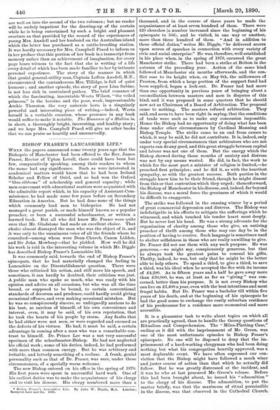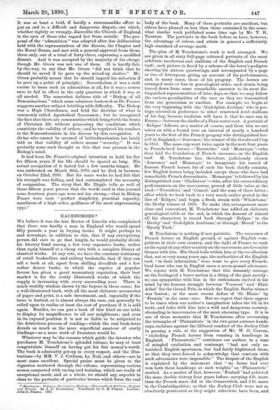BISHOP FRASER'S LANCASHIRE LIFE.*
WHEN the papers announced some twenty years ago that the Bishopric of Manchester had been offered to the Rev. James Fraser, Rector of Upton Lovell, there could have been but few, comparatively speaking, among their readers to whom the name had any significance. Such as were interested in academical matters would know that he had been Ireland Scholar and Fellow of Oriel, and so had won the Oxford "blue-ribbons " of scholarship and general capacity ; while men conversant with educational matters were acquainted with the admirable report which, in his capacity of Assistant-Com- missioner, he had made some few years before on Secondary Education in America. But he had done none of the things which commonly lead men to bishoprics. He had not managed a great parish, or made himself known as a popular preacher, or been a successful schoolmaster, or written a learned book. But all who did know Mr. Fraser were quite sure that Mr. Gladstone had made an excellent choice. That choice almost dismayed the man who was the object of it, and it was only to the unanimous voice of all the friends whom he consulted—among whom were Dean Church, Canon Liddon, and Sir John Mowbray—that he yielded. How well he did his work is told in the interesting volume in which Mr. Diggle has described Bishop Fraser's Lancashire life.
It was commonly said, towards the end of Bishop Fraser's episcopate, that he had materially changed the feeling in Lancashire on the Disestablishment question. There were those who criticised his action, and still more his speech, and sometimes, it can hardly be doubted, their criticism was just. A public man who spoke so much, who was ready with his opinion and advice on all occasions, but who was all the time bound, or supposed to be bound, to certain conventional standards of decorum and prudence, could hardly avoid giving occasional offence, and even making occasional mistakes. But he was so conspicuously sincere, so unfeignedly anxious to do his best, so careless of himself, of his own convenience and interest, even, it may be said, of his own reputation, that he took the hearts of his people by storm. Any faults that he had either were not seen, or were regarded and excused as the defects of his virtues. He had, it must be said, a certain advantage in coming after a man who was a remarkable con- trast to himself. Dr. Prince Lee was a not very successful specimen of the schoolmaster-Bishop. He had not neglected his official work; some of his duties, indeed, he had performed with more than common energy. But he was arbitrary and irritable, and latterly something of a recluse. A frank, genial personality such as that of Dr. Fraser, was sure, under these circumstances, of a specially warm welcome.
The new Bishop entered on his office in the spring of 1870. His first years were spent in uneventful hard work. One of his earliest duties was to make the acquaintance of his clergy and to visit his diocese. His clergy numbered more than a
• Bishop Fraser's Lancashire Life. By John W. Diggle, M.A. London : Sampson Low and Co. 1889.
thousand, and in the course of three years he made the acquaintance of at least seven hundred of them. There were 420 churches (a number increased since the beginning of his episcopate to 506), and he visited, in one way or another, more than three hundred of them. "And in addition to these official duties," writes Mr. Diggle, "he delivered scores upon scores of speeches in connection with every variety of civic and social enterprise." He was, therefore, well established in his place when, in the spring of 1878, occurred the great Manchester strike. There had been a strike at Bolton in the autumn of the preceding year. Action of the same kind followed at Manchester six months afterwards, and the con- flict rose to its height when, on May 8th, the millowners of Preston, from which a large portion of the support fund had been supplied, began a lock-out. Dr. Fraser had had more than one opportunity in previous years of bringing about a reconciliation between masters and men in disputes of this kind, and it was proposed in some quarters that he should now act as Chairman of a Board of Arbitration. The proposal came to nothing. The masters refused arbitration. They said, and seem to have been right in saying, that the conditions of trade were such as to make any concession impossible. Hence the Bishop had no opportunity of doing what has been done under other circumstances by Cardinal Manning and Bishop Temple. The strike came to an end from causes to which, it may be said, he did not contribute. It is, indeed, only under very special circumstances that arbitrators who are not experts can do any good, and this great struggle between capital and labour was not one of them. But the energy which the Bishop showed during those months of anxiety and distress was not by any means wasted. He did, in fact, the work to which for the most part a minister of religion is limited,—he preached first principles ; and he did it, as with the heartiest sympathy, so with the greatest success. Both parties in the struggle knew him to be their friend, though he might dissent from this or that contention which they urged ; thenceforward, the Bishop of Manchester in his diocese, and, indeed, far beyond his diocese, was a moral force the greatness of which it would be difficult to exaggerate.
The strike was followed in the ensuing winter by a period of great commercial depression and distress. The Bishop was indefatigable in his efforts to mitigate the sufferings which he witnessed, and which touched his tender heart most deeply. But he never lost his head. He was a strong advocate for the organisation of charity among those who give, an untiring preacher of thrift among those who may one day be in the position of having to receive. Such language is sometimes used to shelter selfishness in those who are really unwilling to give. Dr. Fraser did not use them with any such purpose. He was generous, —we might say, conspicuously generous, but that he always took the greatest pains to conceal his gifts. Thrifty, indeed, he was, but only that he might be the better able to help others. To spend a third, to give a third, to save a third, was his ideal when he accepted the See with its income of £4,200. As in fifteen years and a half he gave away more than £30,000, he was, at least as far as " giving " was con- cerned, better than his purpose. It is not every Bishop who can live on £1,400 a year, even with the best intentions and most frugal habits. But Dr. Fraser was a bachelor till within five years of his death, and at the beginning of his episcopate he had the good sense to exchange the costly suburban residence of his predecessor for a residence more economical and more accessible.
It is a pleasanter task to write about topics on which all are practically agreed, than to handle the thorny questions of Ritualism and Comprehension. The " Miles-Platting Case," ending as it did with the imprisonment of Mr. Green, was one of the most unfortunate episodes in Bishop Fraser's episcopate. No one will be disposed to deny that the im- prisonment of a hard-working clergyman who had been doing nothing but what his congregation heartily approved, was a most deplorable event. We have often expressed our con- viction that the Bishop might have followed a much wiser and juster course of action than that which he actually did follow. But be was greatly distressed at the incident, and it was he who at last procured Mr. Green's release. Before this had been brought about, he issued his " admonition " to the clergy of his diocese. The admonition, to put the matter briefly, was that the maximum of ritual permissible in the diocese, was that observed in the Cathedral Church. It was at least a bold, if hardly a statesmanlike effort to put an end to a difficult and dangerous dispute, one which, whether rightly or wrongly, discredits the Church of England in the eyes of those who regard her from outside. The pro- posal of the " admonition " was adopted after due deliberation held with the representatives of the diocese, the Chapter and the Rural Deans, and met with a general approval from them, three only, out of a total of forty-three, expressing a modified dissent. And it was accepted by the majority of the clergy, though Mr. Green was not one of them. (It is hardly fair, by-the-way, to say that Mr. Green " did not think that he should be saved if he gave up the mixed-up chalice." Mr. Green probably meant that he should imperil his salvation if he gave up a point of principle.) Nevertheless, it was a rash course to issue such an admonition at all, for it was a course sure to fail in effect in the only quarters in which it was at all needed. The somewhat dubious title of " Bishop of all Denominations" which some admirers bestowed on Dr. Fraser, suggests another subject bristling with difficulty. The Bishop was a High Churchman, and held the doctrine of what is commonly called Apostolical Succession ; but he recognised the fact that there are communities which bring forth the fruits of Christian life without possessing the conditions which constitute the validity of orders ; and he regulated his conduct to the Nonconformists in his diocese by this recognition. A divine who cannot be accused of latitudinarianism has lately told us that validity of orders means "security." It was probably some such thought as this that was present in the Bishop's mind.
It had been Dr. Fraser's original intention to hold his See for fifteen years, if his life should be spared so long. His actual occupation of it lasted but a few months longer. He was enthroned on March 26th, 1870, and he died, in harness, on October 22nd, 1885. But for some weeks he had felt that his strength was failing, and had contemplated the necessity of resignation. The story that Mr. Diggle tells so well of those fifteen years proves that the words used in this journal some fourteen years ago were not too strong,—that in Bishop Fraser were seen " perfect simplicity, practical capacity, manliness of a high order, godliness of the most unpresuming type."







































 Previous page
Previous page